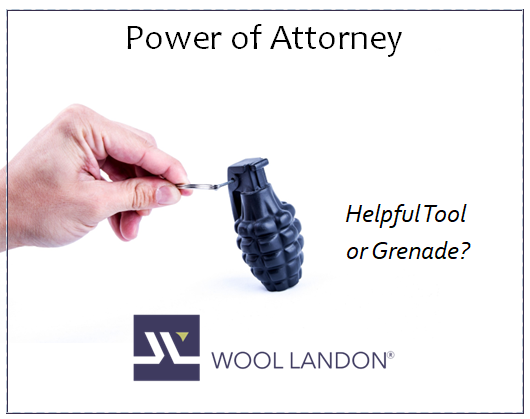Abby Wool Landon, Trust and Estate Attorney
I am the founder of Wool Landon, a boutique trusts and estate firm with a practice focused on formation of estate and disability plans, tax and business succession related planning, and arising litigation such as will contests, trust contests, probate and trust administration disputes, guardianships and conservatorships, financial abuse, conversion of assets and interference with inheritance.
Today’s discussion addresses the legal power of attorney, a much misunderstood and abused document. A legal power of attorney is a signed document by which a person gives their personal legal and financial power to another person or a corporate fiduciary.
Q: What is the most frequently asked question?
A: It is not a question, instead it is the most frequent misunderstanding.
Q: What is the most frequent misunderstanding?
A: “I can deal with that when my loved one is dead because I have the power of attorney.”
Q: Why is the most frequently asked question the most frequent misunderstanding?
A: Because it references the most frequently misunderstood document: the legal power of attorney.
Q: I can easily find one on-line, should I use it?
A: In almost all cases, you should not.
Q: Why shouldn’t I use an on-line power of attorney?
A: Sadly, without guidance, a signed legal power of attorney is the functional equivalent of a grenade.
Q: Why is a signed legal power of attorney the equivalent of a grenade?
A: The signer has given someone all their legal and financial rights, opening the door to a series of potential financial and social disasters.
The signer has to be legally competent to sign the legal power of attorney.
The signer is the “principal.” The person who is appointed is the “agent,” or “attorney in fact.” The agent has a “fiduciary” duty to the principal, to act for the sole and exclusive benefit of the principal, applying a duty of care, loyalty, good faith, and confidentiality. Often the individual granted these duties does not understand them, and others intentionally misappropriate assets to benefit themselves not the principal.
A “principal” has to have legal and financial capacity to sign a legally binding power of attorney. Frequently, an unwitting family member obtains a signature from someone who is already cognitively impaired or diagnosed with dementia. If they do not have capacity, the power of attorney is not valid, and the agent isn’t properly appointed to serve in that capacity. Taken alone, that mistake doesn’t stop the agent from exercising the authority set out in the document. Third parties like banks, realtors and legal advisors may not know or even be able to guess that the principal lacked financial capacity to sign the document.
One primary limitation is one of the most frequent misunderstanding – the legal power of attorney is void on the death of the principal. It cannot be used to settle the estate of the principal when the principal dies. It cannot be used at all after the principal dies.
Not infrequently, the person who is appointed (the “agent”) doesn’t understand the duties of the appointment, doesn’t know if the document is valid or not, and is unaware of its power and its limitations.
In the hands of someone without good intentions, it is a license to steal.
Unfortunately, for every good intentioned effort to obtain a power of attorney without advice of a trust and estate attorney, there are many ill intended efforts. The legal power of attorney in the hands of the well intentioned may be a danger to both the principal and the agent, but in the hands of someone without good intentions, it is a license to steal. The bad acting agent pulls the pin on the grenade and BOOM! — they have transferred the principal’s assets to their own account to remodel their home, pay their creditors, purchase luxury goods and more. A common refrain from an adult child who is also an agent is, “I’m just borrowing against my inheritance” or “my parent would want me to have these funds.”
So what is the solution if your loved one didn’t execute a legal power of attorney when they were competent to do so? Hire a skilled lawyer to assist you in applying for a limited or indefinite conservatorship. The absolute best solution to these problems is to work with a skilled trust and estate attorney while an individual is legally and financially competent to develop their estate and disability plan.
At Wool Landon, we ask our clients to carefully consider the benefits of naming a professional fiduciary or corporate trustee who is bonded or insured, and who knows the importance of their fiduciary duties. In the long run, it is the least expensive option for many families.

